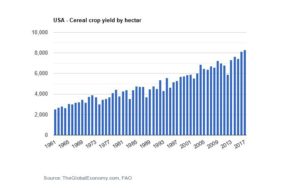The Milwaukee Journal Sentinel and other media outlets are selling the story that global warming is devastating Wisconsin apple production. Real-world data, however, show any climate change that may be occurring is boosting global crop production, American crop production, and Wisconsin crop production. Moreover, cold weather rather than heat was the culprit in the few times during recent years when Wisconsin apple crop production suffered.
The Journal Sentinel published an October 1, 2019, article titled, “Fighting back against climate change: Wisconsin farmers find ways to protect their crops, our food supply.” The article focused heavily on anecdotal stories of Wisconsin apple farmers who speculate that climate change is harming their crops. But after spending several paragraphs asserting “changing climate conditions” and more frequent “severe events” are harming apple crops, the Journal Sentinel finally, in paragraph 10 of the article, specifies just what changing climate conditions and severe weather events are harming Wisconsin apple production. The culprit: severe frost events that occurred later in the spring in 2012 and 2016 than is normally the case.
You read that correctly. The Journal Sentinel is blaming persistent cold temperatures on global warming.
This is the lie, the climate delusion that climate activists consistently assert. By reframing their global warming alarm as a “climate change” alarm, they can claim any and all weather events – even persistent and severe cold – is being caused by global warming.
The article describes “the responsibility of the scientific community to point out the effects of climate change.” An even greater responsibility, however, is to point out the effects of climate change accurately and honestly. Global warming cannot be responsible for cooling, at least not without convoluted and dubious speculative bullspitting.
If global warming is causing global harm to the global apple crop, then why is it that European apple yields set all-time records last year? And while European apple farmers suffered a disappointing 2017 crop, that was the result of unusually cold spring temperatures – something that will become less common if the Earth continues its modest recent gradual warming.
How is climate change impacting U.S. crop production as a whole? Objective data show U.S. crop production is enjoying long-term, mid-term, and short-term yield increases, with almost every year setting a new record. The chart below, compiled from United Nations crop data, illustrates U.S. production of the three most important crops: corn, wheat, and rice.
In short, alarmist claims that global warming is harming Wisconsin apple production are a fraud. Apple production and crop production as a whole are quite strong. And cold events rather than heat events are the culprit in the few years when apple production in Wisconsin and other places disappoints.

